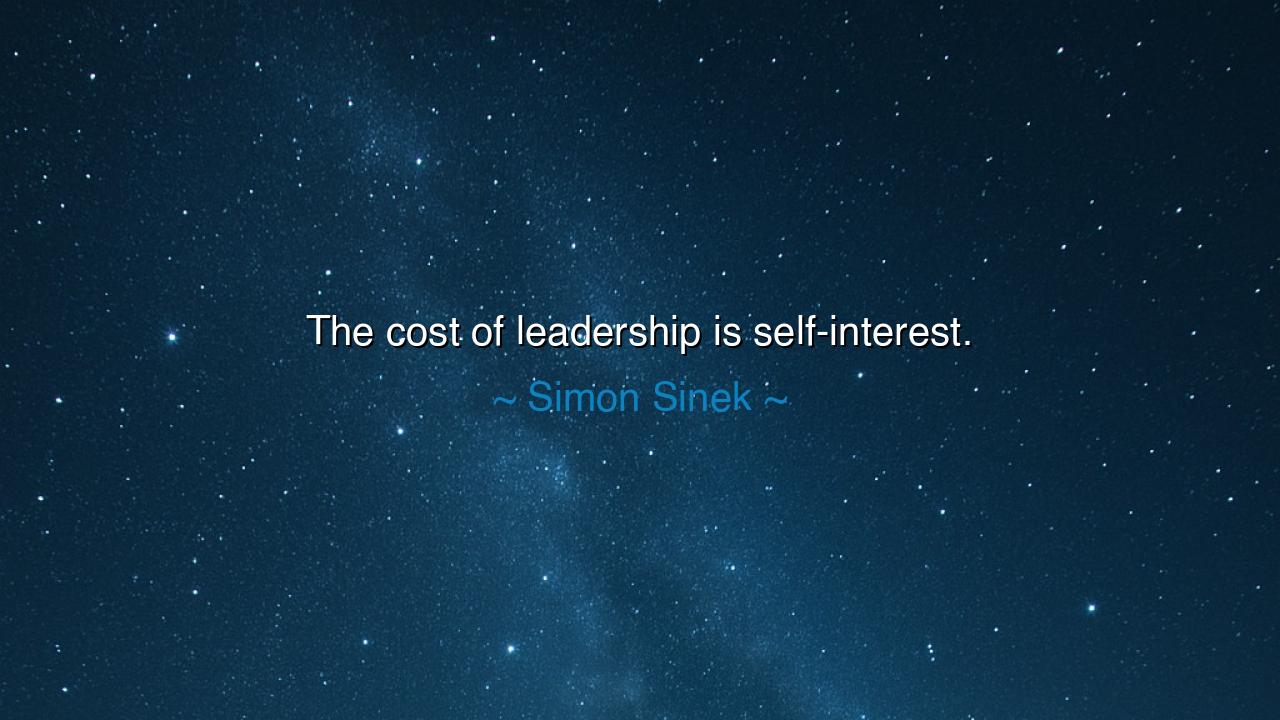
The cost of leadership is self-interest.






Hear the words of Simon Sinek, teacher of vision and voice of purpose, who declared: “The cost of leadership is self-interest.” This is not a gentle saying, but a hard truth, forged in the fire of human struggle. For to lead is not to rise above others for gain, but to descend into sacrifice for their sake. The one who would be a true leader must surrender the throne of the self, laying aside the hunger for power, wealth, or glory. The price of guiding others is to give up living only for oneself.
The ancients knew this well. When the shepherd guarded his flock, he did not eat while they hungered, nor sleep while wolves prowled. His first thought was not his own comfort, but their survival. So too with kings, generals, and chiefs of old: the worthy ones gave of themselves so that their people might thrive. But when leaders yielded to self-interest, kingdoms crumbled and armies faltered, for no people will follow long the one who feeds himself while letting others starve.
History bears witness. Consider the life of George Washington. When the war for American independence was won, his soldiers and people would have made him king. Here was his chance to grasp endless power, to exalt his own name. Yet he refused. He laid down his command and returned to private life, showing the world that his cause was not his own interest, but the liberty of his people. That act of sacrifice gave birth to a nation and set the standard for generations. His leadership endured precisely because he paid its price—his own ambition.
Contrast this with the fall of Napoleon. Brilliant in strategy, adored by his troops, he rose higher than nearly any man of his age. But at last, self-interest consumed him. His hunger for conquest outweighed the welfare of his people, and he dragged them into endless wars that bled France dry. The leader who once inspired became the tyrant who was feared, and in time, abandoned. Thus the warning is clear: leadership cannot survive when it turns inward to self.
Sinek’s words reveal the core of the burden: to lead is to put others first. To carry their struggles, to share their pain, to fight for their future even at cost to one’s own. This does not mean the leader is without reward, but that his reward is different: not the fleeting comfort of self-indulgence, but the enduring honor of service. His power is not measured by what he keeps, but by what he gives away. His greatness is not in how many bow to him, but in how many rise because of him.
The meaning of the quote, then, is not merely moral but practical. For when a leader embraces self-interest, trust withers. Followers see quickly where true loyalty lies, and they withdraw their own. But when a leader proves, again and again, that he places others above himself, trust grows deep, loyalty endures, and unity thrives. In this way, sacrifice is not only virtue—it is the very lifeblood of effective leadership.
The lesson is clear: if you would lead, prepare to pay the cost. Examine your heart and ask: Do I seek power for myself, or do I seek to lift others? Be ready to set aside pride, wealth, and ease when the needs of your people demand it. Live as the servant first, and the leader second. Protect those under your care before protecting yourself. For only then will you lead not as a tyrant, but as a guardian, not as a master, but as a steward.
Therefore, let your practice be thus: in every decision, measure not what you gain, but what your people gain. When you are tempted to seize the larger portion, give it away. When you are tempted to hide in safety, step into the storm. When you are tempted to raise yourself high, bend down and lift another. For Simon Sinek has spoken truly: the cost of leadership is self-interest. Pay it gladly, and in return, you will gain the only treasure that endures—the respect, trust, and love of those you lead.






AAdministratorAdministrator
Welcome, honored guests. Please leave a comment, we will respond soon